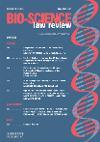Bio-Science Law Review - Volume 18 - Issue 6

ARTICLES
COMPETITION LAW IMPLICATIONS OF GENERIC DRUG PRICE RISES
CHRISTOPHER STOTHERS AND ALESSANDRA GALEA
Freshfields Bruckhaus Deringer LLP, London
The CMA has sought to use competition law to challenge price rises for generic drugs under prohibitions on abuse of a dominant position and any agreements seeking to restrict competitive entry by new suppliers under prohibitions on anti-competitive agreements. The results have been mixed, particularly where the UK and other authorities have sought to challenge price increases in themselves, despite frequent media interest.
THE COST CHALLENGE: HOW CAN THE UK COURTS REMAIN COMPETITIVE FOR PATENT LITIGATION IN THE A NEW ERA?
GORDON D HARRIS
Gowling WLG, London
Despite recent reforms, the costs of UK patent litigation have not fallen significantly. With UK courts soon to face competition from the Unified Patents Court, what can the courts do to swing the balance in their favour where there are no compelling reasons to go with one or the other? The author suggests seven options if the UK courts are to remain competitive.
VAT ON CONTRACT TERMINATIONS AND LITIGATION SETTLEMENTS: A CHANGING LANDSCAPE IN THE UNITED KINGDOM
ELOISE WALKER
Tax Partner,
Pinsent Masons, London
In February 2022 HMRC published a revised policy on the VAT treatment of early termination payments and other commercial contractual compensation payments. This article considers the background to the changes, and examines the detail of the new rules and their impact on commercial contracts
AI TECHNOLOGY AND PATENTING IN THE LIFE SCIENCES: AN OVERVIEW
ALEXANDER KORENBERG AND SARAH LAU
Kilburn and Strode LLP,
London
AI holds great promise for the advancement of understanding in the life sciences. This article considers what can be patented and how to decide whether to do so.
HIGH PRIORITY: THE ENLARGED BOARD TAKES ON EPO PRIORITY PRACTICE IN THE G1/22 -G2/22 REFERRAL CASES Click here for pdf
GABOR MESTER, STACEY J. FARMER, SARAH DAHL AND MARTIN GRUND
Patent Attorneys, Grund Intellectual Property Group, Munich
The questions referred to the EPO’s Enlarged Board in these cases were (1) whether the EPO has jurisdiction to determine ‘successor in title’ priority entitlement, and (2) whether the ‘PCT joint applicants approach’ can be extended to determine the validity of a priority claim for international applications filed under PCT procedures. The authors consider that if question (1) is admissible, then both questions should be answered in the affirmative.
CASE COMMENT
FULL FEDERAL COURT CLARIFIES RULES FOR EXTENDING THE TERM OF PHARMACEUTICAL PATENTS IN AUSTRATLIA
KIM O'CONNELL, VICKY ZHANG AND EUGENIA MUÑOZ
King & Wood Mallesons
Sydney
Where two or more pharmaceutical substances are disclosed and claimed in a patent, the calculation of the term of the extension of the patent will be based on the earliest date of ARTG (Australian Register of Therapeutic Goods) inclusion of goods containing any of the substances.
NEWS
EUROPEAN REPORTS
Italian Sunshine Act and Transparency in the Health Sector
GIUSEPPE AMINZADE AND ANGELO FORTE Hogan Lovells, Milan
